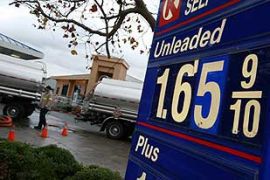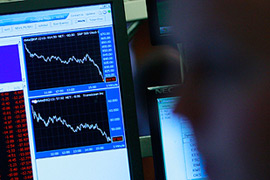Economic data spell bad news
Few signs of recovery visible as US, Russia, China and Europe issue stark crisis warnings.

David Greenlaw, an economist with Morgan Stanley in New York, cited “modest upside surprises in consumption and capital spending” as he reduced an estimate of fourth-quarter gross domestic product contraction to a 5.9 per cent annual rate from 6.4 per cent.
There was another potentially hopeful sign that a determined effort by policymakers to stimulate the economy by pushing interest rates down might be bearing fruit.
Mortgage applications up
The US Mortgage Bankers Association said applications for new mortgage loans hit the highest level in five years last week.
The housing sector was “ground zero” for the current downturn after a lengthy period of reckless lending and soaring prices that began to crash in 2007.
The interest rate on 30-year fixed-rate mortgage loans dropped to a 37-year low of 5.14 per cent this week, according to Freddie Mac.
 |
| The impact of the US recession is spreading around the world [AFP] |
Consumers spending in November fell for a fifth straight month and incomes shrank.
Spending fell 0.6 per cent after dropping one per cent in October.
As a result of falling prices for goods from petrol to clothing, though, inflation-adjusted spending was up 0.6 per cent, the first increase since May.
On the labour front, a separate report showed new US weekly jobless claims rose by 30,000 over the past week to 586,000.
On oil markets, light sweet crude for delivery in February shed $3.63 to close at $35.35 a barrel on the New York Mercantile Exchange, the ninth consecutive drop in prices.
Analysts said the declines were driven by worries about a global recession that saps energy demand.
The low price spells bad news for Russia, the world’s second-biggest producer after Saudi Arabia.
Russian unrest
A senior official in Moscow warned that the crisis could spark popular unrest after a Kremlin economic aide said Russia next year would have its first budget deficit since the 1998 financial crisis.
“The (budget) deficit is caused by the fall in oil prices, above all,” Kremlin economic aide Arkady Dvorkovich was quoted as saying.
Commenting on the worsening situation, Mikhail Sukhodolsky, Russia’s deputy interior minister, cautioned that unpaid wages, the threat of layoffs and unpopular government anti-crisis measures “may aggravate the protest mood.”
A central bank source confirmed on Wednesday that authorities devalued the rouble for the seventh time in a month.
In China, on the other hand, a senior economic planner spoke of “great challenges” ahead.
Zhang Ping, head of the National Development and Reform Commission, told parliament that “grave risks” lay ahead for the government’s economic goals if China did not manage to stimulate demand and maintain export growth.
Economists have warned that the global downturn could mean that China will end 2008 with its weakest economic growth for nearly two decades.
China has not posted annual growth of less than 7.6 percent since 1991.
European woes
On the continent, Germany’s intended stimulus plan proved to be smaller than the 40bn euro originally reported for new projects and was unlikely to ease pressure on Angela Merkel.
The German chancellor has been attacked by politicians and economists who want her government to do more to boost the economy.
Further east, Poland’s central bank said it was likely to cut rates further in 2009.
In Madrid, King Juan Carlos said the global economic crisis shows Spain must play a strong role in world affairs to ensure its “growth, well-being and security.
In his traditional Christmas message, issued on Wednesday, Carlos said: “The current economic crisis shows how much we depend ever more on the rest of the world and we have to know how to skilfully manage the defence of our interests in the world.”